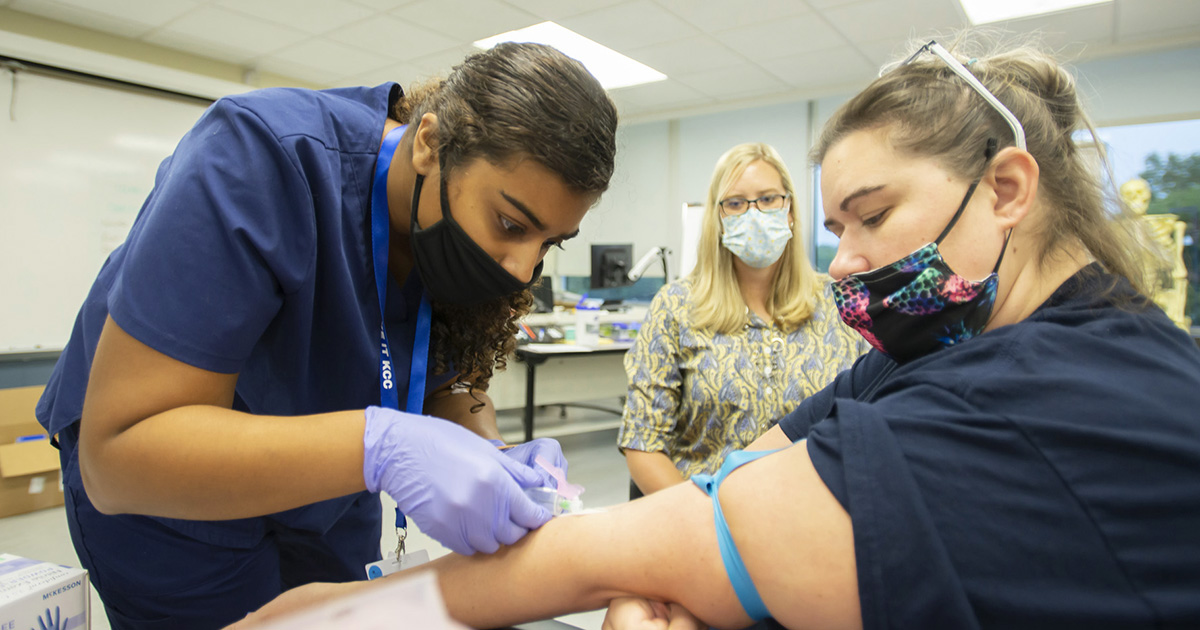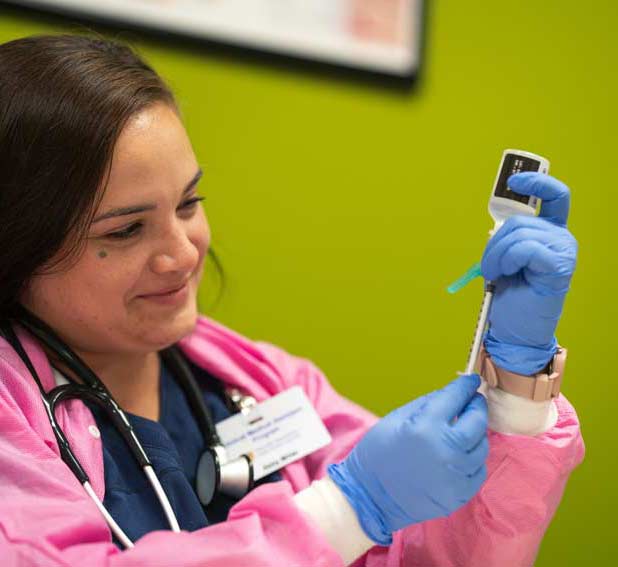The Path to Qualification: Comprehending the Phlebotomy Training Program Trip and Its Importance
As you think about the path to qualification in phlebotomy, it's vital to recognize the duty you'll play in health care. Your training will cover vital skills, from blood collection methods to patient communication. Each component of the program prepares you for the challenges ahead. What exactly does the journey entail, and why is accreditation so vital for your future occupation? Allow's check out these questions better.

The Role of Phlebotomists in Medical Care
Phlebotomists play an important role in the healthcare system, working as the crucial link between patients and important diagnostic testing. You'll perform blood attracts, guaranteeing examples are gathered accurately and securely. Your proficiency assists in diagnosing clinical problems, checking health, and guiding therapy choices.
In your everyday interactions, you'll require to develop trust with patients, making them really feel comfortable throughout what could be a demanding experience. You are in charge of classifying and managing samples carefully to avoid contamination or errors, which could influence test results.
Past this, you'll usually work along with medical professionals and nurses, connecting important information about people' conditions. By mastering your skills, you contribute meaningfully to person care, making you an important component of the clinical group.
Review of Phlebotomy Training Programs
When checking out phlebotomy training programs, you'll locate different types created to fit various routines and discovering styles. Each program aids you create vital abilities like blood collection and patient interaction. Recognizing these alternatives is vital to picking the ideal path for your occupation.
Sorts Of Educating Programs
Several kinds of training programs are offered for those aiming to become skilled in phlebotomy. You can pick from certification programs, which generally last a couple of months and focus on essential abilities. There are also diploma programs that give a more complete education, commonly lasting up to a year. If you're trying to find a deeper understanding, an associate degree in a relevant field may be the right fit. On-line courses supply adaptability for those balancing work or family members commitments, permitting you to study at your very own pace. In addition, some hospitals and clinics supply on-the-job training programs, giving practical experience while you discover. Whatever path you select, each program aims to outfit you with the essential abilities for an effective phlebotomy job.

Key Skills Established
Mastering phlebotomy requires a set of essential abilities that are developed through comprehensive training programs. In addition, interaction skills are fundamental; you'll need to connect with individuals, describe treatments, and put them at ease. Each of these skills is necessary for your success as a qualified phlebotomist, making you a valuable property in any kind of medical care setup.
Secret Elements of a Phlebotomy Program
In a phlebotomy training course, you'll focus on necessary topics that prepared for your future career. You'll take part in hands-on training that enables you to use what you've discovered in real-world setups. Both the core educational program and functional experience are important for your success as a phlebotomist.
Curriculum Overview
While seeking a phlebotomy training course, you'll come across a curriculum developed to equip you with essential abilities and expertise. Phlebotomy Courses Near Me. This educational program usually includes anatomy and physiology, concentrating on the blood circulation system and recognizing blood elements. You'll also discover around various kinds of blood collection approaches, consisting of venipuncture and capillary puncture strategies
Additionally, infection control and safety protocols are important components, ensuring you recognize just how to keep a sterilized environment. You'll research patient communication, highlighting interaction and empathy, which are crucial for reducing patient stress and anxiety. Ethical and lawful factors to consider will be resolved, preparing you for real-world responsibilities. This fundamental expertise will allow you to succeed as a phlebotomist and offer quality treatment in medical settings.
Hands-On Training Experience
Obtaining hands-on experience is a vital component of your phlebotomy training course. This useful training permits you to use what you have actually learned in a real-world setting, boosting your skills and confidence. Phlebotomy Classes Near Me.
Furthermore, you'll get the chance to interact with individuals, which is essential for developing your communication abilities. This mix of technical proficiency and interpersonal skills is important for your success as a qualified phlebotomist. Eventually, hands-on training is where concept fulfills practice, solidifying your understanding and preparedness for certification.
Certification and Licensing Requirements
Before you can start your career in phlebotomy, it is essential to recognize the accreditation and licensing requirements that differ by state. A lot of states need phlebotomists to hold an accreditation from an acknowledged organization, such as the National Phlebotomy Association or the American Society for Medical Pathology. These accreditations generally entail that site passing a test that evaluates your expertise and abilities in the field.
Along with qualification, some states have certain licensing requirements. You may need to finish a certain variety of hours in professional technique, send proof of training, or undergo a background check. It is essential to research your state's policies to see to it you satisfy all required standards.
Staying notified regarding these requirements not only helps you secure a placement yet likewise enhances your credibility as a specialist. By fulfilling these needs, you'll be well official source on your means to a successful profession in phlebotomy.
Hands-On Training and Practical Experience
Hands-on training and useful experience are essential parts of your phlebotomy education, as they enable you to apply theoretical expertise in real-world circumstances. Throughout your training, you'll take part in monitored venipuncture, learn appropriate strategies, and end up being accustomed to various blood collection equipment. This direct involvement is essential for developing your self-confidence and honing your skills.
You'll work very closely with experienced experts that can assist you with the nuances of patient communication and example handling. Each session not just enhances your understanding but additionally prepares you for the fast-paced atmosphere of healthcare setups.
Additionally, lots of programs integrate professional turnings, enabling you to experience varied setups, from hospitals to outpatient facilities. This exposure assists you adjust to different challenges and client demands, ensuring you're well-prepared for your future role. Embrace these opportunities, as they're important to becoming a qualified and compassionate phlebotomist.
Challenges Faced During Training
While getting hands-on experience is vital, it's essential to acknowledge the difficulties that can emerge throughout your phlebotomy training. Furthermore, mastering the abilities needed for blood attracts takes practice; you may battle with technique originally.
Time management can additionally be a hurdle, as balancing theory, sensible sessions, and individual dedications can really feel daunting. You might face varying finding out rates among your peers, resulting in sensations of insecurity if you think you're falling back. Adapting to the different characters of trainers Get More Info can be tough, as each might have an one-of-a-kind mentor style.
Recognizing these obstacles early on can prepare you for success and help you develop strength throughout your training trip.
Profession Opportunities After Certification

As you gain experience, you might even consider focusing on locations like pediatric or geriatric phlebotomy, satisfying details person demands. Some phlebotomists pick to progress their careers by becoming research laboratory technicians or seeking additional education in healthcare areas.
In addition, your accreditation can lead to functions in training or supervising new phlebotomists, enabling you to share your knowledge. With the healthcare market consistently growing, your skills will always remain in demand, paving the means for a stable and satisfying job. Embrace the opportunities waiting on you!
Regularly Asked Inquiries
What Is the Typical Duration of a Phlebotomy Training Training Course?
Phlebotomy training courses commonly last around 4 to 8 weeks. You'll engage in hands-on practice, classroom instruction, and on the internet knowing. Completing this training prepares you for accreditation and a rewarding job in medical care.
Are Online Phlebotomy Courses Available?
Yes, on-line phlebotomy programs are offered. They use versatility and comfort, enabling you to examine at your very own speed. Just verify the program is certified to satisfy accreditation needs and acquire useful abilities for your job.
Exactly How Much Does Phlebotomy Training Generally Price?
Phlebotomy training commonly costs in between $700 and $2,500, depending on the program and location. You must take into consideration variables like program length, included materials, and hands-on experience when choosing the ideal training for you.
What Are Usual Prerequisites for Phlebotomy Training?
Common prerequisites for phlebotomy training frequently consist of a high school diploma or GED, immunizations, and a background check. Some programs may additionally need standard health care understanding or qualifications, ensuring you're gotten ready for hands-on training.
Can I Function While Finishing My Phlebotomy Training?
Yes, you can function while completing your phlebotomy training. Lots of trainees balance tasks with their researches, but make particular to handle your time successfully to ensure you satisfy both work and training dedications successfully.